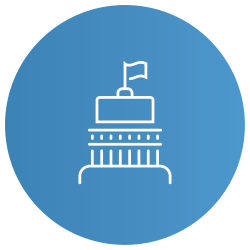Solar 101 Program
Core Course Lessons

Federal, State and Other
Policy Considerations
Click each lesson below to expand and read the course descriptions
Federal policy is a key mechanism for driving growth in the solar and storage industry and continues to influence the deployment of solar and storage systems today. This introductory presentation will discuss the history of federal policy in solar energy and and impact it has on solar and storage businesses.
Presented by: Erin Duncan, Vice President of Congressional Affairs, SEIA
The ITC and PTC are cornerstones of federal tax policy enabling accelerated growth in the solar and storage industry. This lesson will cover the basic functions of these policy mechanisms and how they help continue to drive further deployment of solar and storage technologies.
Presented by: Jeremy Woodrum, Senior Director of Congressional Affairs, SEIA
In order to obtain the full value of the ITC, it is necessary to understand the additional adder requirements to fulfill when considering applying for the credit. This presentation will cover what these requirements are and how they can alter the value of the ITC credit received.
Presented by: Jeremy Woodrum, Senior Director of Congressional Affairs, SEIA
Public Utility Commissions (PUCs) and Public Service Commissions (PSCs) are the entities that work to regulate and the impact it has on solar and storage businesses. This lesson explains what PUCs and PSCs are, how they function, what authority they hold across different U.S. states, and how they can affect the solar industry.
Presented by: Sean Gallagher, Senior Vice President of Policy, SEIA
Renewable Portfolio Standards (RPSs) and Renewable Energy Certificates (RECs) have worked harmoniously together to increase the deployment of renewable resources. This lesson covers what the main functions of these mechanisms are, how they are interconnected, and what impacts they can have on clean energy.
Presented by: Sean Gallagher, Senior Vice President of Policy, SEIA
Environmental Justice is playing an increasingly important role in the development of solar energy and a just, equitable clean energy transition. This presentation will explore the origins and core principles of Environmental Justice, and the implications for incorporating these perspectives in the clean energy industry.
Presented by: Erika Symmonds, Vice President of Equity and Workforce Development
Environmental Justice is playing an increasingly important role in the development of solar energy and a just, equitable clean energy transition. This presentation will explore the origins and core principles of Environmental Justice, and the implications for incorporating these perspectives in the clean energy industry.
Presented by: Erika Symmonds, Vice President of Equity and Workforce Development, SEIA
Expanding access to solar energy is critical to ensure a just and inclusive transition to a clean energy economy. This presentation will cover how states, the federal government, and innovative industry programs are helping expand the availability of solar energy to communities that have historically been underserved or left behind.
Presented by: Erika Symmonds, Vice President of Equity and Workforce Development, SEIA
Codes and standards play an integral role in both the regulation and deployment of renewable energy systems. This lesson will cover what codes and standards are, the evolving nature of codes and standards, and what role SEIA plays in establishing a favorable environment for solar energy in this space.
Presented by: Erika Symmonds, Vice President of Equity and Workforce Development, SEIA



